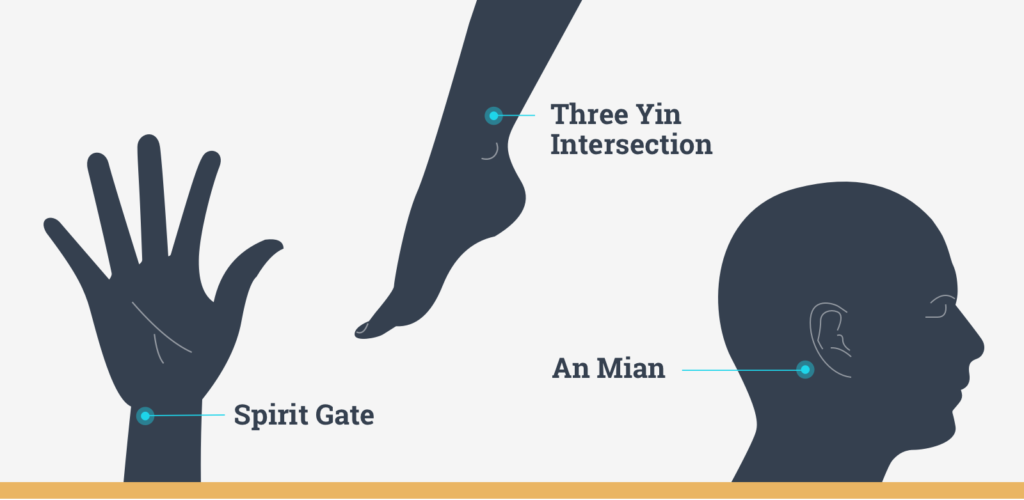
What is Acupressure?
Acupressure is a traditional Chinese medicine technique that involves applying pressure to specific points on the body to stimulate energy flow and promote relaxation. Similar to acupuncture, acupressure relies on using gentle but firm pressure from the fingers or hands rather than needles. It is based on the belief that there are meridians, or channels, in the body through which vital energy, known as qi, flows. By activating these points, one can restore balance and address various ailments.
Each acupressure point is believed to correspond with specific organs or systems. Stimulating these points helps to release tension, ease blockages in qi, and promote relaxation. For example, pressing on a point between the eyebrows, called Yintang, is said to help calm the mind and relieve stress. Another point, Shen Men on the upper ear, is often used for sleep. Understanding these key points and their functions is essential for effectively using acupressure to fall asleep naturally.
Can Acupressure Help with Insomnia?
Acupressure can be a helpful tool for managing insomnia, as it promotes relaxation and calmness—two factors essential for sleep. Research suggests that stimulating certain acupressure points may help regulate the body’s energy flow, reducing stress and creating a calm state conducive to sleep.
Specific pressure points like the Anmian point (behind the ear) or Shen Men on the ear are associated with stress relief. Stimulating these areas can trigger endorphin release, which helps promote a relaxed, tranquil state. Acupressure can also support melatonin production, a hormone essential for regulating our sleep-wake cycle. Targeting points like Yin Tang (between the eyebrows) or Spirit Gate (near the wrist) can improve melatonin secretion, aligning the body’s circadian rhythm and promoting deeper, restorative sleep.
How to Use Acupressure to Get to Sleep
Acupressure offers a non-invasive way to promote relaxation and improve sleep quality. By targeting specific points on the body, you can release tension that may be keeping you awake.
Key Acupressure Points:
- Spirit Gate: Located on the inside of your wrist, applying gentle pressure with your thumb in a circular motion for 2–3 minutes can help induce relaxation and promote sleep.
- Three Yin Intersection: Found on the inner ankle just above the ankle bone, use your index finger to apply firm pressure for 2–3 minutes while taking slow, deep breaths. This can calm your mind and body, allowing you to drift off more easily.
Incorporating rhythmic breathing and progressive muscle relaxation alongside these pressure points can also be effective. By pairing deep breathing exercises with gentle massaging or tapping on areas like the forehead or temples, you signal your body to wind down, making it easier to fall asleep.

Does Acupressure Have Risks?
Generally safe, acupressure is a gentle approach to promoting relaxation and better sleep. However, there are some risks and precautions to keep in mind.
- Discomfort or Pain: Applying pressure too forcefully or on the wrong points can cause discomfort. Make sure you’re applying pressure correctly, and adjust if needed.
- Skin Irritation or Bruising: Excessive pressure can lead to skin irritation or bruising. It’s important to practice acupressure mindfully and adjust pressure as your body requires.
- Contraindications: If you have certain medical conditions, such as osteoporosis, are pregnant, or have recent injuries, some points may be contraindicated. Those experiencing dizziness, nausea, or exacerbation of health issues should be cautious and consult a healthcare provider or acupressure practitioner before proceeding.
Who is Acupressure Best For?
Acupressure can be beneficial for many, but it may be especially helpful for:
- Individuals with Stress and Anxiety: Regularly experiencing stress or anxiety can disrupt sleep. Acupressure’s calming effects can help these individuals unwind and prepare for restful sleep.
- Chronic Pain Sufferers: Targeting pressure points associated with pain relief can reduce discomfort and create a more comfortable sleeping environment. People with arthritis, fibromyalgia, or migraines may find acupressure particularly helpful.
- Those Preferring Natural Remedies: Acupressure is a natural, non-invasive approach that aligns well with holistic health preferences, making it ideal for individuals who prefer alternatives to medication for sleep issues.
When to See a Doctor
If you experience persistent sleep issues despite trying acupressure, or if your sleep troubles worsen, it may be time to seek medical advice. Chronic insomnia can significantly impact health, and consulting a healthcare provider can help uncover any underlying conditions.
Signs it may be time to see a doctor include:
- Difficulty falling or staying asleep for more than a few weeks despite regular acupressure practice.
- Symptoms such as excessive daytime fatigue, irritability, or mood changes.
- Lack of improvement in sleep quality or duration even with consistent acupressure.
A healthcare provider can assess your sleep patterns and overall health, recommending additional therapies or lifestyle adjustments if needed. Taking a proactive approach to addressing sleep challenges is crucial for well-being.
Conclusion
Acupressure offers a natural and effective method for enhancing sleep quality and well-being. By applying gentle pressure on specific points, you can promote relaxation, reduce stress, and encourage calmness, aiding in sleep.
Though acupressure should complement, not replace, traditional medical treatments for insomnia, many have found it beneficial when incorporated into a bedtime routine. Consulting with a healthcare provider or licensed acupuncturist can help you ensure safe and effective use of acupressure. Pairing acupressure with other healthy sleep habits—like a consistent bedtime, a peaceful sleep environment, and avoiding stimulants before bed—may lead to a more restful sleep.
Taking time to connect with your body through acupressure can foster deeper physical and mental awareness. Embrace this ancient practice, allowing it to guide you toward a peaceful night’s rest.